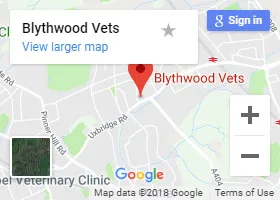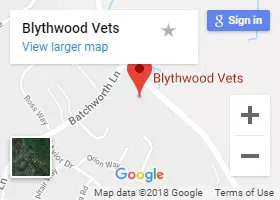Keeping your pet and family safe from parasites requires regular flea and worm prevention. Infestations can be uncomfortable, costly, and harmful, making preventative care the best approach.
At Blythwood Vets, we tailor parasite protection to suit your pet’s individual needs. Our vets assess their lifestyle and habits to recommend the most effective flea and worm treatments.
Year-round flea, tick, and worming protection is one of the many benefits of our Pet Health for Life Plan.
Sign up today and start saving!
Book a flea and worm treatment appointment
Flea Treatments
Fleas are one of the most common external parasites in pets and are the cause of many skin problems. Although you may only see fleas on your pet, they are continually shedding eggs in your home and can lead to a home flea infestation. Flea bites to you and your family can be costly and complicated to treat. Did you know the adult flea can stay in its cocoon for up to 6 months before it emerges?
Although fleas are small, they can make your pet miserable. Once on your pet, fleas can bite every 5 minutes leaving your cat or dog itchy and uncomfortable. You only need to bring one flea inside your home to start an infestation. One female flea can produce enough eggs to quickly escalate the problem in your home.
Fleas live on a variety of animals such as rabbits and hedgehogs, as well as cats and dogs. When your pet is outdoors, fleas from the eggs left behind by other animals can jump on your pet. Once on your pet, they feed on his or her blood and start laying eggs.
Worms
There are various worms that can infect your pets, and they can pose a threat to your family. Worms that target pets include roundworms, hookworms, lungworms, and tapeworms, and they are prolific across the United Kingdom. Certain worm can produce more than 100,000 eggs per day, which are then passed in the pet’s faeces and spread throughout their living environment.
Your family can accidentally ingest worm eggs that have been passed through your pet’s faeces. The eggs can then hatch in your intestinal tract, and the worms can travel to various tissues in the body, including the eyes and brain, potentially causing serious infections.
Worms are a year-round threat and the only way to keep your pet and family safe is through proactive actions to get the best products. Lungworm, which is passed on by slugs and snails, is potentially fatal and many over the counter products do not tackle this worrying parasite.
Please be aware that many products available elsewhere other than sold at Blythwood Veterinary clinic and hospital may be ineffective at treating all the species of worms and fleas your pet could get. There are many ranges of worming treatments available including tablets, liquids, granules and spot-ons.
Book a flea and worm treatment appointment
Tick Protection
 Since ticks are a common parasite that can infect pets, we at Blythwood Vets advise pet owners to take precautions against tick bites and to be aware of the risks involved.
Since ticks are a common parasite that can infect pets, we at Blythwood Vets advise pet owners to take precautions against tick bites and to be aware of the risks involved.
Ticks can transmit diseases to pets, including Lyme disease. These diseases can cause serious health problems for pets, and in some cases, can even be fatal. Therefore, it is important to take preventative measures to protect your pets from tick bites.
Here are some tips for tick prevention in pets:
-
Use a tick preventative treatment - There are many different tick preventative products available, including spot-on treatments, collars, and oral medications. These treatments work by killing ticks before they have a chance to bite and can be a highly effective preventative measure.
-
Check your pet for ticks regularly - After spending time outside, be sure to thoroughly check your pet for ticks. Ticks can attach anywhere on the body, but are most commonly found around the head, ears, neck, and feet. If you find a tick, use tweezers to carefully remove it, making sure to get the entire tick and avoiding crushing it.
-
Keep your garden tidy - Ticks thrive in tall grass and other vegetation, so keeping your garden well-maintained and mowed can help to reduce the tick population.
-
Avoid walking in wooded or brushy areas - These are high-risk areas for ticks, and avoiding them can help reduce the risk of tick bites.
-
Talk to your vet - Your vet can provide guidance on tick preventative products and offer recommendations based on your pet's individual needs.
You may help shield your dogs from the dangers of tick bites by heeding these suggestions and taking preventative action. Make sure to give Blythwood Vets a call right now if you have any worries or enquiries regarding tick prevention for your pet.
Flea and Worm Risks in Your Local Area
Parks, woodlands, and even back gardens can be hotspots for fleas, ticks, and worms—especially in the warmer months (April–October).
Preventative treatments allow your pet to explore freely while staying protected from harmful parasites.
For expert advice and tailored treatments, contact Blythwood Vets today!
Spread the cost of essential healthcare for your pet
Pet Health for Life offers comprehensive care and great value for money throughout your pet’s life. By joining Pet Health for Life you can spread the cost of essential preventative treatments and make savings on your regular pet care, including year-round flea, worm and parasite prevention.
Book a flea and worm treatment appointment
Spread the cost of flea and worm treatment for your pet

To spread the cost of routine worming and flea treatment for your pet, Blythwood Vets offer the Pet for Life Health plan, which includes parasite control for your pet.
More information about prevention for cats & dogs
Parasite prevention for cats Parasite prevention for dogs Parasite prevention for rabbits
Frequently Asked Questions:
What happens to my pet if they don't have flea and worm treatment?
When it comes to worm treatment, there may be severe consequences if ignored. Depending on the type of worm your pet can experience irritation such as intestinal blockages, obstruction of blood flow in the heart, artery inflammation, anaemia, and even death if left untreated.
Can you get combined flea and worm treatment for pets?
There are combined flea and worm treatments you can get for your pets, also known as an all-in-one flea and wormer. However, it's always best to consult your veterinary practice as these treatments don't cover some types of worms. Your pet may also have complications that combined treatments don't cover.
How often does my pet need flea and worm treatment?
Once every month, you should treat your pet for fleas, and every two to three months, or even more frequently, for worms. Depending on your pet's lifestyle, talk to your vet about the best course of action.
How long should I wait between worming and flea treatments?
Many people wonder if they can treat their cats for fleas and worms at the same time or how long they should leave between treatments. Depending on the two treatments being administered you may need to wait either 48 hours or two weeks between treatments. Please ask your vet when picking up your flea and worm treatment how to apply the two treatments most effectively and safely.
Do indoor cats need flea and worm treatment?
Every cat, even indoor cats, need regular flea and worm preventative treatments. It is a common misconception that an exclusively indoor cat does not need these treatments – this is not true at all. Fleas commonly travel on clothes and bags and so may be brought into the house at any time. A cat could even pick up fleas during a trip to a vet, especially where other pets may not have been treated.
Do rabbits need flea and worm treatment?
You must consistently employ effective, preventative medicines against the most prevalent parasites throughout the lifespan of your rabbit to ensure their wellbeing and long-term health, as well as that of your family and Rabbits. Keep in mind that prevention is much simpler and less expensive than treatment. Rabbits also suffer from several other parasites and conditions, such as Mites, Flystrike, and E. cuniculi.






